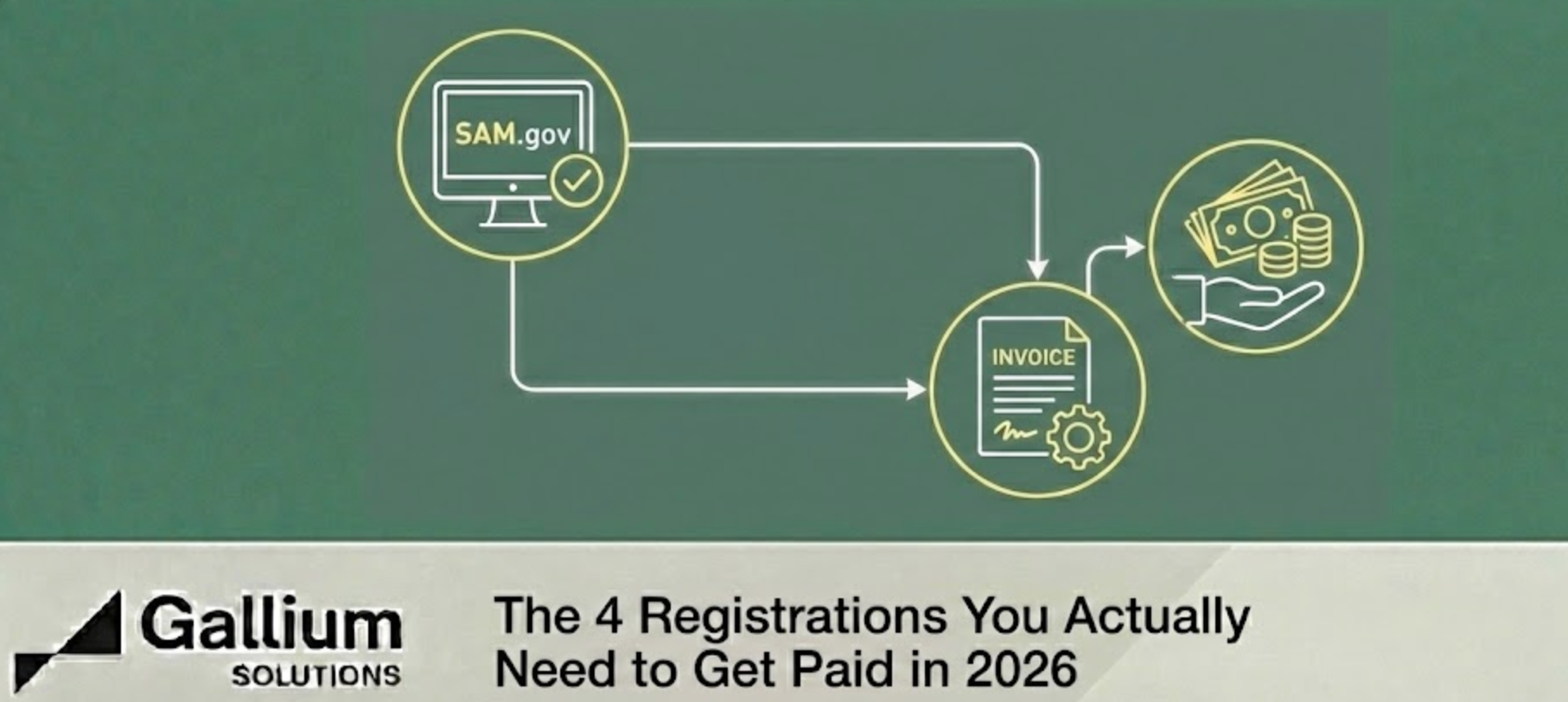How Small Businesses Can Compete With Primes In Government Contracting

Breaking into government contracting can feel like an uphill battle for small businesses. With large prime contractors dominating the landscape, it’s easy to believe securing a meaningful government contract is out of reach. However, the truth is small businesses have unique advantages that agencies value, and with the right approach, you can compete head-to-head with even the biggest players.
Government agencies are under increasing pressure to meet small business participation goals. Many contracts are even ‘set aside’ exclusively for small businesses to ensure they can bring diverse and innovative solutions to the table. If you understand where your strengths lie and how to leverage them effectively, you can capitalize on these opportunities and establish a consistent pipeline of government work.
In this article, we’ll walk through practical strategies small businesses like yours can use to compete with ‘primes’, including smart targeting, relationship building, strategic teaming, and differentiating through innovation and agility.
Winning government contracts isn’t just about size.
It’s about focus, relationships, and execution.
7 Specific Ways Your Small Business Can Compete Directly With Primes
There are seven specific ways your small business can compete directly with primes, and we’ll cover each:
- Understand where you have a competitive advantage
- Focus on strategic targeting
- Build relationships early
- Highlight past performance strategically
- Build smart teams
- Craft your bids to be tangibly different
- Stay agile and focused
Ok, let’s break these down.
Understand Where You Have a Competitive Advantage
Many government agencies have small business contracting goals they must meet each year. These goals create built-in opportunities for small businesses to compete for and win contracts that primes may otherwise dominate. In addition to set-asides, which are specifically reserved for small businesses, many larger procurements require prime contractors to subcontract a portion of the work to small business partners.
Beyond eligibility advantages, small businesses often bring greater flexibility, specialized expertise, and innovative thinking to the table. While primes can be slow-moving and broad in focus, your business can quickly adapt to changing agency needs and deliver niche capabilities that directly support mission success. By building strong relationships and demonstrating deep domain expertise, your small business has the chance to ‘level the playing field’ and even outshine much larger competitors.
Focus on Strategic Targeting
One of the biggest mistakes your small business can make is trying to pursue every available opportunity. Instead, it’s far more effective to target agencies that have a strong track record of supporting companies like yours.
Many agencies, such as the Department of Defense, Department of Homeland Security, and the Department of Veterans Affairs, actively prioritize small business participation and offer programs to offer equal opportunities. By narrowing your focus to agencies that value businesses like yours, you can dramatically improve your chances of success.
It’s also important to research both current and expiring contracts where small business participation is actively encouraged. Some of these, such as 8(a), SDVOSB, WOSB, and HubZone, are structured so that primes cannot compete directly with you. Identifying these opportunities early on helps you position yourself ahead of the competition and align your capabilities with agency needs before these agencies release their solicitations.
Build Relationships Early
In government contracting, relationships often matter as much, if not more, than technical expertise. Networking with agency decision-makers before an opportunity arises can significantly increase your chances of success. By attending industry days, matchmaking events, and agency outreach sessions, you can gain valuable insights into agency priorities, upcoming requirements, and procurement timelines, which each give you a competitive edge when agencies release solicitations.
Building strong ties with prime contractors is equally important. Many primes need reliable small business partners like you to meet subcontracting requirements, especially on large-scale projects. Establishing yourself as a trusted subcontractor not only opens doors for immediate work but also builds a track record of past performance that can help you compete directly for prime contracts in the future.
In short, great relationships today lead to consistent revenue streams tomorrow!
Highlight Past Performances Strategically
For small businesses like yours, how you present your past performance can make all the difference. Rather than drawing attention to your company size, focus on packaging relevant experiences in a way that highlights outcomes, problem-solving abilities, and alignment with your mission. Contracting officers want to see evidence that you understand their needs and can deliver results, even if you haven’t yet managed large-scale government projects.
If your company’s direct past performance is limited, don’t be afraid to leverage related experiences. You can use partner past performance, key personnel resumes, and subcontracting roles to demonstrate capability and reduce perceived risk. The goal is to prove your team possesses the knowledge, reliability, and expertise necessary to fulfill the contract, regardless of the number of employees on your team or your years in operation.
Build Smart Teams
Teaming can be a powerful way for small businesses like yours to ‘punch above your weight’ in government contracting. Forming Joint Ventures (JVs) or entering into formal teaming agreements allows you to combine your capabilities, past performance, and resources with other companies to create a more competitive offer. Whether partnering with another small business or a larger firm, teaming can help you quickly build credibility and meet contract requirements that may be challenging to satisfy alone.
The key is to position yourself as a critical, non-replaceable part of the team. Highlight your specialized skills or unique expertise that directly supports the mission, so you aren’t seen as just another vendor. Offering full-solution capabilities through strategic partnerships not only strengthens your bids but also enhances your value in the eyes of both agencies and prime contractors seeking reliable small business collaborators.
Craft Your Bids to Be Tangibly Different
Large prime contractors often play it safe, submitting conservative, slow-moving proposals filled with boilerplate language. Your small business has a unique advantage: it offers room for creativity, better responsiveness, and direct alignment with agency needs, all while coming with fewer roadblocks. When you emphasize agility and a solutions-driven approach, your startup can stand out from cookie-cutter proposals and present itself as a true mission partner rather than just a vendor.
When bidding, focus on speed, innovation, and cost-effectiveness.
Tailor each proposal specifically to the agency’s mission objectives, using clear, targeted language showing you understand their priorities. Also, ensure that you avoid generic responses and instead demonstrate how your team will solve their problems faster, more efficiently, and with greater attention to detail than your larger competitors. A customized, mission-focused proposal often resonates far better than a generic one.
Stay Agile and Focused
One of the biggest advantages your startup has is agility. Unlike large primes who feel the weight of bureaucracy, your business can pivot quickly as agency needs evolve. This ability to adapt to changing mission requirements, budget shifts, and emerging priorities makes you an invaluable partner to contracting officers who require responsible and flexible support.
Rather than trying to offer everything to everyone, stay focused on a narrow set of capabilities where you can truly excel. Agencies aren’t looking for generalists, but rather specialists who can solve specific problems with deep expertise. By positioning yourself as a trusted niche expert, you’ll build a stronger brand reputation and land top of mind when new opportunities arise.
In Conclusion
Breaking into government contracting as a small business isn’t easy, but it’s possible. By understanding where you have a natural competitive edge and positioning yourself strategically, you can carve out real opportunities even in a market dominated by primes. Agencies are actively looking for small businesses that bring innovation, agility, and mission-driven expertise to the table.
Winning government contracts isn’t about having the biggest team or the longest track record—it’s about being smart, focused, and responsive. Whether through strategic targeting, early relationship-building, creative teaming, or customized proposals, your small business can stand out by delivering exactly what agencies need in ways that primes often can't match.
If you stay agile, lead with your strengths, and build the right relationships along the way, you won't just compete—you'll thrive. The path is there. It’s simply a matter of taking the right steps, consistently and confidently.
Curious to learn more about how you can take advantage of your unique strengths. Book a call here and we'll chat!












